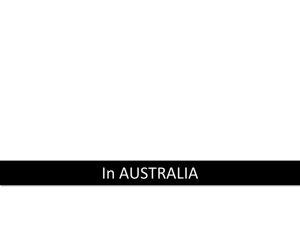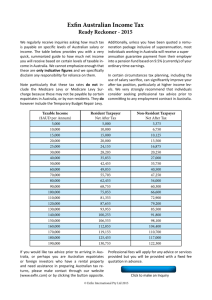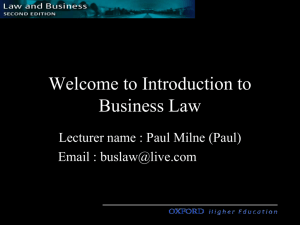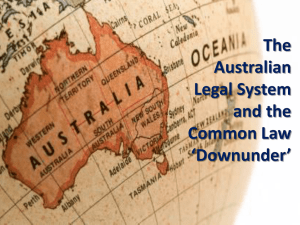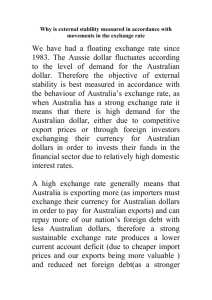james buchanan questions oct 2007
advertisement
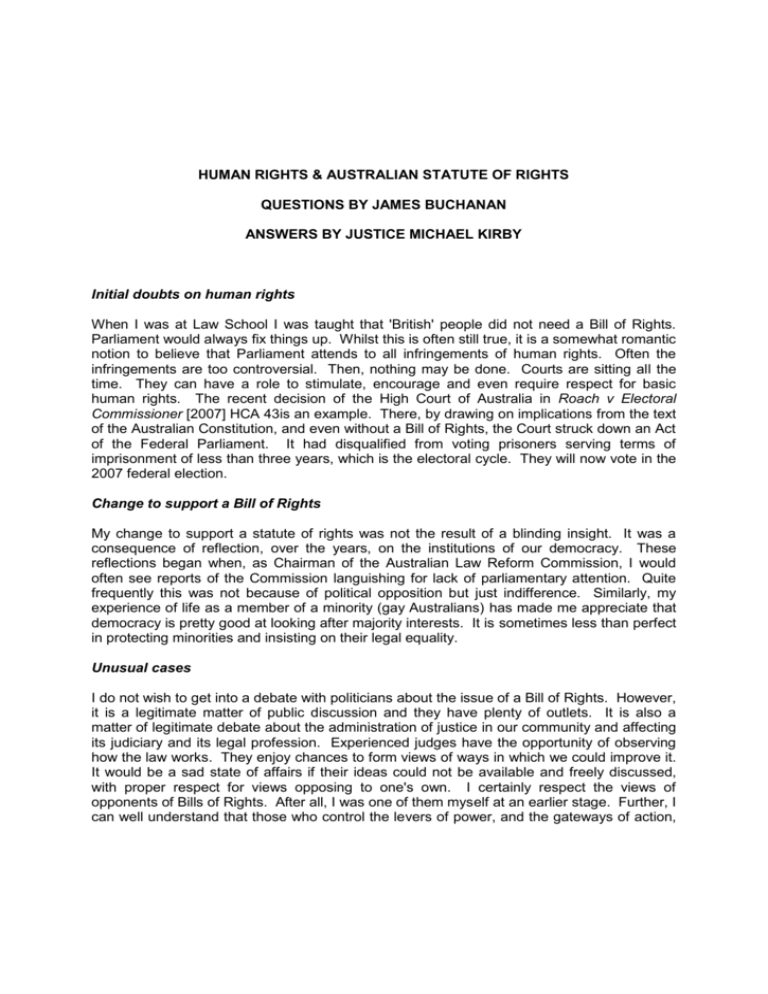
HUMAN RIGHTS & AUSTRALIAN STATUTE OF RIGHTS QUESTIONS BY JAMES BUCHANAN ANSWERS BY JUSTICE MICHAEL KIRBY Initial doubts on human rights When I was at Law School I was taught that 'British' people did not need a Bill of Rights. Parliament would always fix things up. Whilst this is often still true, it is a somewhat romantic notion to believe that Parliament attends to all infringements of human rights. Often the infringements are too controversial. Then, nothing may be done. Courts are sitting all the time. They can have a role to stimulate, encourage and even require respect for basic human rights. The recent decision of the High Court of Australia in Roach v Electoral Commissioner [2007] HCA 43is an example. There, by drawing on implications from the text of the Australian Constitution, and even without a Bill of Rights, the Court struck down an Act of the Federal Parliament. It had disqualified from voting prisoners serving terms of imprisonment of less than three years, which is the electoral cycle. They will now vote in the 2007 federal election. Change to support a Bill of Rights My change to support a statute of rights was not the result of a blinding insight. It was a consequence of reflection, over the years, on the institutions of our democracy. These reflections began when, as Chairman of the Australian Law Reform Commission, I would often see reports of the Commission languishing for lack of parliamentary attention. Quite frequently this was not because of political opposition but just indifference. Similarly, my experience of life as a member of a minority (gay Australians) has made me appreciate that democracy is pretty good at looking after majority interests. It is sometimes less than perfect in protecting minorities and insisting on their legal equality. Unusual cases I do not wish to get into a debate with politicians about the issue of a Bill of Rights. However, it is a legitimate matter of public discussion and they have plenty of outlets. It is also a matter of legitimate debate about the administration of justice in our community and affecting its judiciary and its legal profession. Experienced judges have the opportunity of observing how the law works. They enjoy chances to form views of ways in which we could improve it. It would be a sad state of affairs if their ideas could not be available and freely discussed, with proper respect for views opposing to one's own. I certainly respect the views of opponents of Bills of Rights. After all, I was one of them myself at an earlier stage. Further, I can well understand that those who control the levers of power, and the gateways of action, -2- may not wish to share that power with more people and to give more access to those levers to those who are currently sometimes disempowered and treated with discrimination and inequality. However, a truly democratic society moves with the times. Anyone can pick out cases from decisions of human rights courts which they disagree with. It is the nature of all judicial decision-making that it draws lines and decides for or against parties. For every case that looks surprising, there will be hundreds of cases that look completely just. For example, it has been the gradual insistence of the European Court of Human Rights on the equal treatment of gay people that has led to the abolition of the legal foundations for discrimination on the basis of sexual orientation throughout Europe. Such decisions, and many, many others, are in my opinion a step in the right direction. It is not good enough to carve in stone on the façade of law courts the boast "Equal Justice Under Law". It is necessary to arm citizens and the courts with the means to ensure that this is a reality. If there are defects in overseas versions of statutes of rights, we can learn from their experience. We can make sure that any such law that we adopt in Australia is wise, balanced and reasonable, with good outcomes that strike us (or most of us) as just and sensible. The decision of Federation It is true that, at Federation, the Founding Fathers (there was no Founding Mothers) decided against incorporating a Bill of Rights in the Australian Constitution. I too favour a nonconstitutional statute of rights. I do not know anyone who is currently suggesting constitutional provisions. We all know that it is almost impossible to change the Australian Constitution. Talk of decisions made in the 1890s is not determinative of what we should do in Australia in 2007. The world and Australia are very different from the rather monochrome, often racist and Imperialist world of Australia of the 1890s. In the intervening century most countries of the world have embraced legal protection for fundamental human rights. The question is whether we, alone, are in step. Elected representatives and unelected elites I am a strong supporter of the democratic elements in our Constitution. I have always respected and, as a judge, upheld parliamentary privileges and the role, spirit as well as letter of parliamentary enactments, so long as they are valid. Governments can sometimes make mistakes. So can courts. However, it was the High Court of Australia that prevented the nationalisation of the banks in 1948 and the banning of the Communist Party in 1951. This was done, based on interpretations of the text and implications of the Constitution. In our type of society, there is a role for elected personnel. There is also a role for the unelected judiciary. This illustrates the checks and balances of our Constitution. -3- In any case, the notion that a visit to the ballot box once every three years is authority to elected representatives to do whatever they like between elections is, as Sir Anthony Mason has described it, a "romantic" view of democracy. It is also somewhat unrealistic. The proposal currently before the Australian community is not for a constitutional Bill of Rights but for a statutory enactment of basic rights. Under such an enactment, as in Britain and New Zealand, the courts would not be empowered to disallow and strike down an enacted law that is inconsistent with basic rights as far as possible. They would be encouraged to interpret the statute so as to conform to the basic rights. But they would also be empowered to draw any remaining inconsistencies to parliamentary and public notice. This could promote a more rights-respecting culture in Australian society. In turn, that would be a step forward for good governance in Australia - just as it has proved in other countries with similar legal systems, like Canada, New Zealand and Britain. Locked in time I agree that Bills of Rights can be locked in a particular time and can get out of date. However, this is mainly a criticism of constitutional Bills of Rights. If the basic rights are contained in a statute of rights, they can be amended as any other enactment of the relevant Parliament can be. This is the type of human rights provision that has now been adopted in Britain, New Zealand, Victoria and the Australian Capital Territory. If we had enjoyed human rights provisions, whether in the Constitution or in a statute of rights earlier, we would probably have dismantled the White Australia Policy long before we finally did in 1966. We might have also improved our treatment of Aboriginals, women, gays and other minority groups if we had been a more rights-respecting community. Even today, members of such groups do not always enjoy equality with fellow citizens in the majority. The notion that courts should be able to draw disparities to political and public opinion should cause no one to take fright. If such provisions can be seen to work in Britain, which was the country originally most hostile to such measures, it is time we considered them in Australia. Visiting judges from England point to the success of the Human Rights Act in that country. The Lord Chief Justice of England, Lord Phillips, recently pointed out in England that, as modern societies become more diverse, racially, culturally and in terms of religion, statutes of rights, of the suggested kind, can assure all citizens of the basic equality that is accorded to them. A vision of rights The preparation of a national statute or Charter of Rights would require time and much consultation. Its contents are not to be predicted superficially. However, as a nation, Australia has signed up to many international treaties which contain statements of fundamental rights. That would be the starting point for finding the basic sources of the rights that we, and the rest of the world, can agree to put beyond partisan politics. Some people complain that it is hard to define the essential characteristics of what it is to be an Australian. Once one gets beyond notions of "mateship" or "fair go" and talk of Gallipoli and the Kokoda Trail or sporting prowess, the verbal expression of our core values generally runs -4- out. That is why it may be time for us to endeavour to express such core values nationally. It might help individuals facing cases of injustice. But it might also help us all to recognise the basic values that we share, living together in this most fortunate country. The values that unite us. The values that help to make us Australians and also good citizens of the world. HUMAN RIGHTS & AUSTRALIAN STATUTE OF RIGHTS QUESTIONS BY JAMES BUCHANAN ANSWERS BY JUSTICE MICHAEL KIRBY

